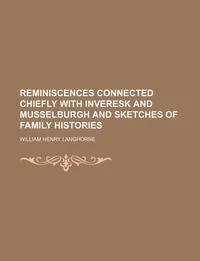Reminiscences Connected Chiefly with Inveresk and Musselburgh and Sketches of Family Histories
Автор: William Henry Langhorne
Переплёт: Мягкая обложка
📙 This historic book may have numerous typos, missing text, images, or index. Purchasers can download a free scanned copy of the original book (without typos) from the publisher. 1893. Not illustrated. Excerpt: ... CHAPTER II It is not easy for those who have, since the completion of the railway system, been almost as familiarly acquainted with Scotland as with their own localities in the south, to realise the difficulties of every, kind which, half a century ago, beset a journey to the northern kingdom, and more especially to the Highlands. Letters now before me speak of two days and two nights spent in the journey between the two capitals by mailcoach; while by the smacks which plied between London and Leith the voyage might last a fortnight The condition of the roads before Macadam and Telford improved them was deplorable, repaired as they were with unbroken stones, thrown without concern into the hollows, or, where such material was wanting, abandoned to mire and mud axle-deep in wet weather, or to sand and dust in the summer. The Border country especially offered hindrances to travelling. It was not so long since watches were kept along the whole line by day and by night. 'Setters, watchers, searchers of the watchers, and overseers were appointed. The inhabitants of the marches, besides, were obliged to keep slough-dogs, or what are called blood-hounds. Persons who were aggrieved or had lost anything were allowed to pursue the hot trode1 with hound and horn and hue and cry. 'The mosstroopers, who got their name from living in the mosses of the country, were the terror of the limits of both kingdoms, amounting as they did to thousands. The life and manners of these plundering thieves are well exemplified in the 1 Anglict, hot or fresh tread. Confession of Georgie Bourne, who suffered when Robert Carey, Earl of Monmouth, was Warden of the Marches. He had killed seven Englishmen with his own hand, cruelly murdering and robbing them, and had spent his whole time ...
Мнения
